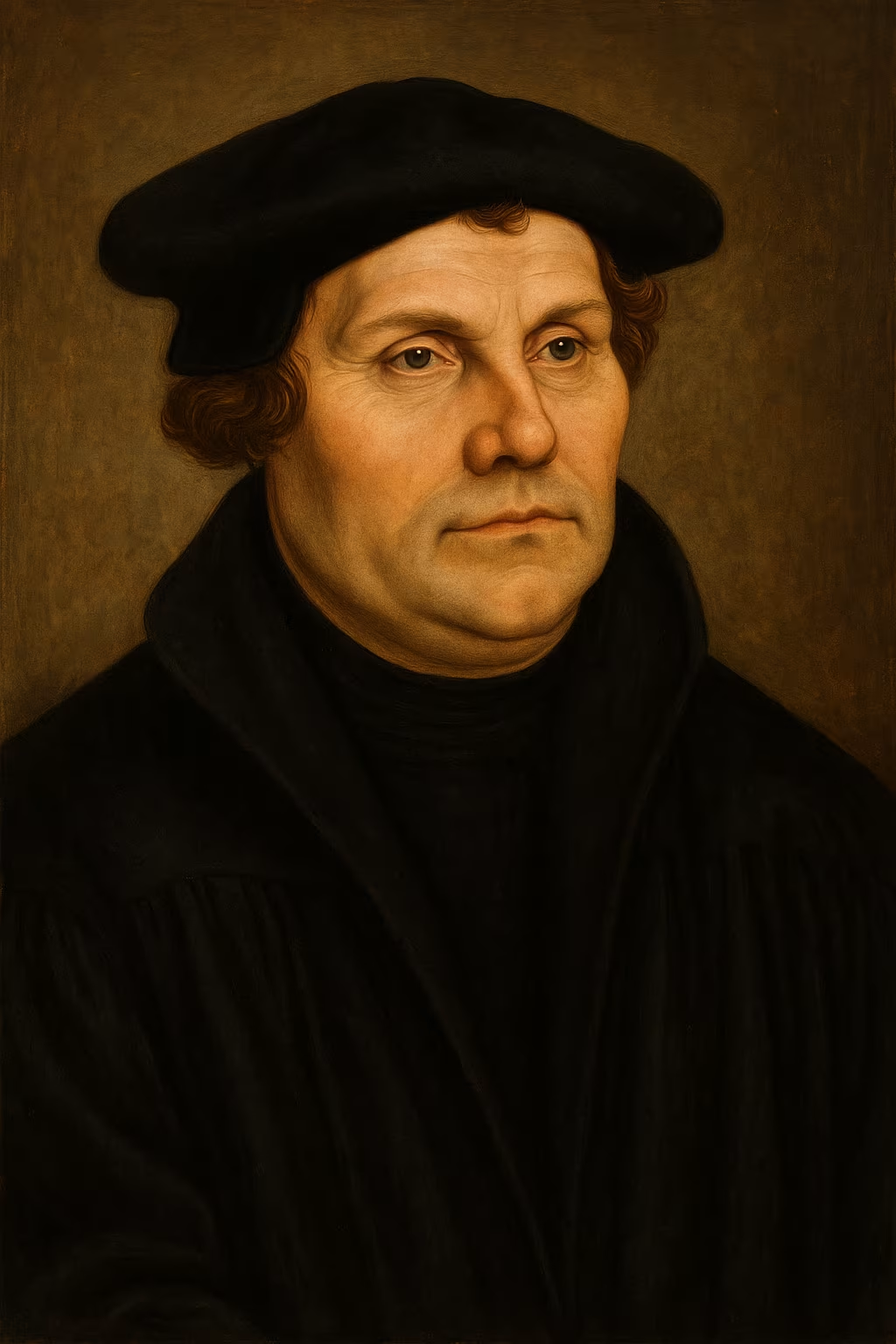Martin Luther (1483 – 1546)
Quick Summary
Martin Luther (1483 – 1546) was a augustinian monk and major figure in history. Born in Eisleben, County of Mansfeld, Holy Roman Empire, Martin Luther left a lasting impact through Publication of the Ninety-Five Theses against indulgences.

Birth
November 10, 1483 Eisleben, County of Mansfeld, Holy Roman Empire
Death
February 18, 1546 Eisleben, Electorate of Saxony, Holy Roman Empire
Nationality
Saxon
Occupations
Complete Biography
Origins And Childhood
Born into a prosperous mining family in Mansfeld, Martin Luther studied at Magdeburg, Eisenach, and the University of Erfurt, earning his master’s degree in 1505. A thunderstorm near Stotternheim prompted his vow to enter the Augustinian monastery at Erfurt, where under Johann von Staupitz he confronted spiritual anxiety and immersed himself in Scripture.
Historical Context
At the turn of the sixteenth century the Holy Roman Empire witnessed territorial consolidation, the spread of print, and mounting criticism of Roman fiscal practices. Humanist scholarship called for a return ad fontes, while indulgence campaigns funded the rebuilding of St. Peter’s. Political and social tensions created fertile soil for reform movements across German lands.
Public Ministry
Ordained in 1507, Luther began lecturing at Wittenberg and received his doctorate in theology in 1512. His lectures on Psalms, Romans, and Galatians articulated a theology of justification by faith. On 31 October 1517 he circulated the Ninety-Five Theses opposing indulgences, launching a debate that spread rapidly through the printing press.
Teachings And Message
In his 1520 treatises Luther set forth the priesthood of all believers, the primacy of Scripture, and salvation by grace through faith. He distinguished law and gospel, crafted catechisms for households and pastors, and urged civic authorities to support education. His hymns and sermons employed vigorous German prose to reach common worshippers.
Activity In Galilee
Centred in Wittenberg, Luther’s reform extended through Saxony and neighbouring territories via visitations, preaching tours, and printed pamphlets. Collaborating with Philipp Melanchthon and Johannes Bugenhagen, he promoted parish inspections, school foundations, and vernacular liturgy throughout northern Germany.
Journey To Jerusalem
Between 1518 and 1521 Luther faced escalating conflict with Rome: interrogations at Augsburg, the Leipzig Debate with John Eck, condemnation by the bull Exsurge Domine, and the dramatic refusal to recant at the Diet of Worms. Sheltered at Wartburg Castle, he translated the New Testament into German and continued to write under the alias Junker Jörg.
Sources And Attestations
Primary evidence includes Luther’s letters, sermons, treatises, imperial edicts, and contemporary chronicles by figures such as Sleidan and Melanchthon. Catholic opponents like Cochlaeus and Prierias produced detailed rebuttals, while civic and princely archives record school ordinances and church visitations implementing Lutheran reforms.
Historical Interpretations
Historians have interpreted Luther variously: nineteenth-century romantics hailed him as a national hero; twentieth-century scholars emphasized his religious interiority, social context, or apocalyptic imagination. Recent studies probe his rhetoric on Jews, his stance during the Peasants’ War, and the transnational networks that spread Lutheran ideas across Europe.
Legacy
Luther’s reforms reshaped Saxon church life with vernacular liturgy, clerical marriage, and educational mandates. His marriage to Katharina von Bora modeled pastoral households, while his Bible translation, chorales, and doctrinal writings inspired the Augsburg Confession, the Book of Concord, and enduring Protestant traditions.
Achievements and Legacy
Major Achievements
- Publication of the Ninety-Five Theses against indulgences
- Translation of the Bible into German from the original languages
- Formulation of justification by faith alone
- Reform of liturgy and establishment of Lutheran church structures
Historical Legacy
As a founder of Protestantism, Martin Luther redefined religious authority, advanced vernacular languages, and inspired educational, political, and musical transformations that shaped modern Europe.
Detailed Timeline
Major Events
Birth
Born in Eisleben to a rising mining family
Monastic vow
Enters the Augustinian monastery at Erfurt after the Stotternheim storm
Ninety-Five Theses
Circulates his theses challenging indulgences from Wittenberg
Diet of Worms
Refuses to recant before Emperor Charles V and is placed under imperial ban
Marriage
Marries former nun Katharina von Bora and establishes a pastoral household
Death
Dies in Eisleben after mediating a Mansfeld dispute
Geographic Timeline
Famous Quotes
"Here I stand; I can do no other. May God help me."
"Faith is a living, daring confidence in God’s grace."
"Next to the Word of God, music deserves the highest praise."
External Links
Frequently Asked Questions
When was Martin Luther born and when did he die?
He was born on 10 November 1483 in Eisleben and died there on 18 February 1546 while mediating a dispute among the Counts of Mansfeld.
Why did Martin Luther publish the Ninety-Five Theses?
He opposed the indulgence traffic promoted by Johann Tetzel and argued that true repentance and justification rest on faith, not financial transactions.
What languages did Martin Luther know?
He spoke German and Latin fluently, read Greek and Hebrew for exegesis, and used French or Italian in select diplomatic letters.
What happened at the Diet of Worms in 1521?
Before Emperor Charles V, Luther refused to retract his writings unless convinced by Scripture or sound reason, leading to his imperial ban.
Which historical sources discuss Martin Luther?
His own writings, imperial records, humanist chronicles, reports by allies like Philipp Melanchthon, and papal archival documents serve as principal attestations.
Sources and Bibliography
Primary Sources
- Martin Luther — 95 Thesen
- Martin Luther — De Libertate Christiana
- Acta et Decreta Reformationis Saxonicae
- Philipp Melanchthon — Historia de vita et actis Lutheri
- Johann Sleidan — Commentariorum de statu religionis et reipublicae
Secondary Sources
- Heiko A. Oberman — Luther: Man Between God and the Devil ISBN: 9780300096613
- Lyndal Roper — Martin Luther: Renegade and Prophet ISBN: 9780812996197
- Scott H. Hendrix — Martin Luther: Visionary Reformer ISBN: 9780300166699
- Carlos M. N. Eire — Reformations: The Early Modern World, 1450–1650 ISBN: 9780300196788
- Thomas Kaufmann — Une histoire de la Réforme luthérienne ISBN: 9782200614728
External References
See Also
Specialized Sites
Batailles de France
Discover battles related to this figure
Dynasties Legacy
Coming soonExplore royal and noble lineages
Timeline France
Coming soonVisualize events on the chronological timeline